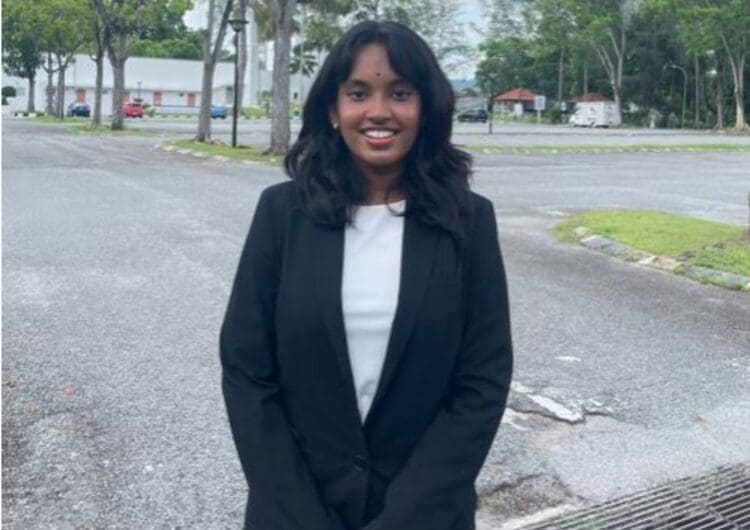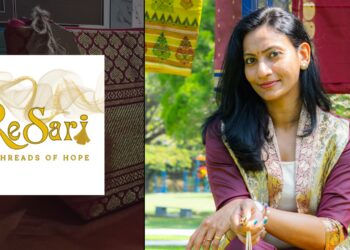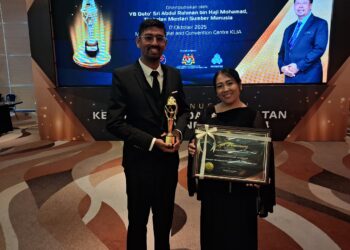In the realm of academic excellence and intellectual pursuit, Kaveeshaswary Thamilarasu has carved out a significant milestone for herself and her community as the first Malaysian Indian to participate in the International Philosophy Olympiad (IPO) 2024, held in Helsinki, Finland. This achievement not only underscores her personal dedication but also highlights broader implications for philosophical education and representation in Malaysia.
Kaveeshaswary Thamilarasu was born and raised in Bukit Beruntung, a suburban area nestled in the district of Rawang, Malaysia. This serene locality provided her with a nurturing environment amidst its community-oriented setting. Growing up in Bukit Beruntung instilled in her values of resilience, diligence, and community spirit, which would later prove instrumental in her academic pursuits.
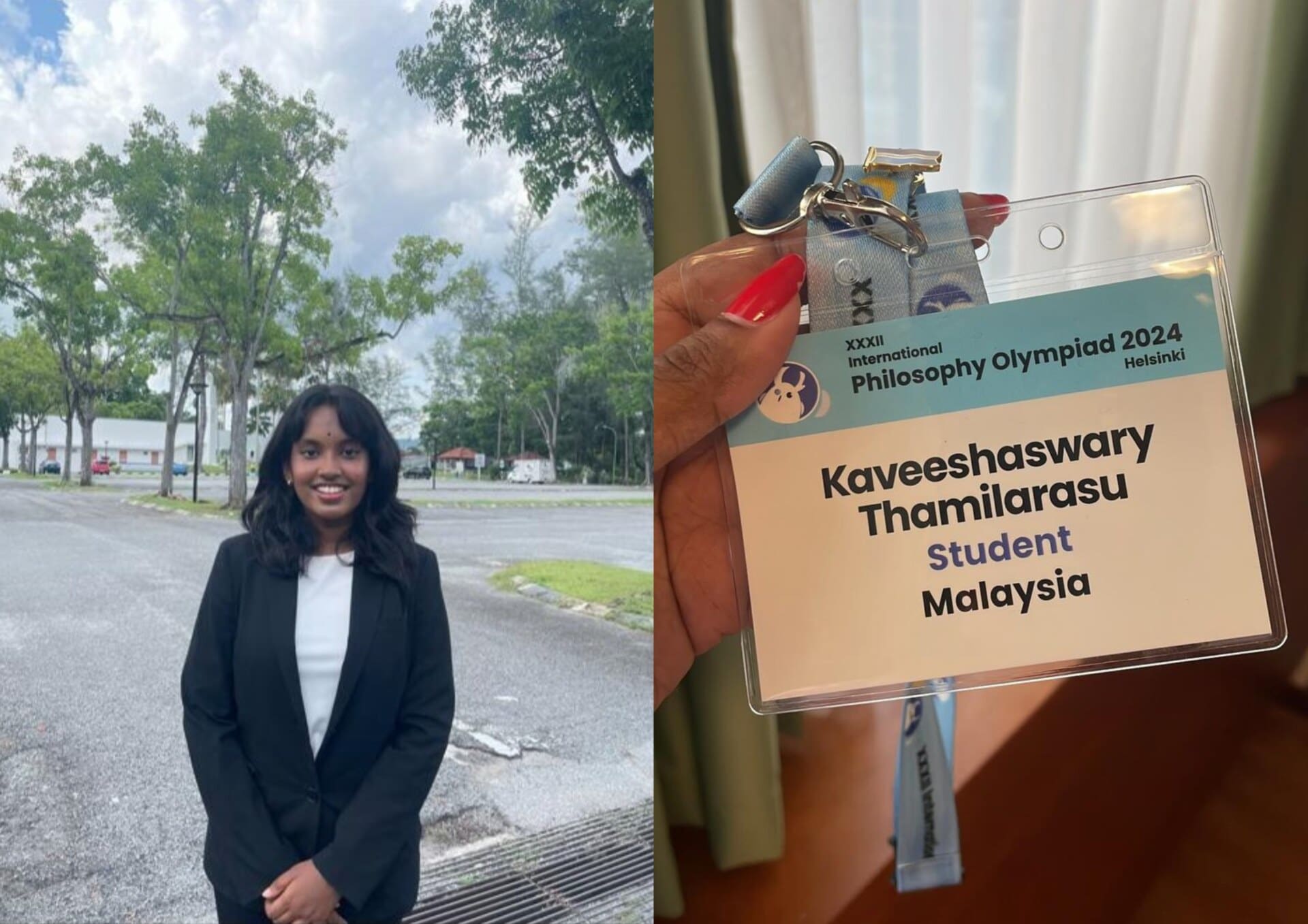
Her academic journey commenced at SJK (T) Ladang Sungai Choh, where she completed her primary education. This period laid the foundation for her intellectual growth and imbued her with a strong academic foundation. The school’s environment and educational ethos likely played a pivotal role in shaping her early academic interests and aspirations.
Currently, Kaveeshaswary Thamilarasu is pursuing her foundation at University Utara Malaysia (UUM) in Kedah with the aspiration of starting an LLB program in the coming months. UUM, renowned for its academic excellence and comprehensive curriculum, is providing her with the necessary academic rigor and theoretical grounding essential for her future career in law.

Kaveeshaswary recently competed in the Malaysian Philosophy Olympiad (MyPO) and successfully secured her place in the International Philosophy Olympiad (IPO) 2024. Her qualification holds special significance as she became the inaugural Malaysian Indian representative at this esteemed event held in Helsinki, Finland, from May 16th to 19th.
“The International Philosophy Olympiad is a prestigious annual competition for high school and pre-university students (ages 11–19) from around the world. It is part of the International Science Olympiads, organized under the auspices of the International Federation of Philosophical Societies and supported by UNESCO,” Kaveeshaswary stated.
She also noted that “since 2018, the Persatuan Pendidikan Falsafah Dan Pemikiran Malaysia has been sending the top two Malaysian delegates to the IPO. However, from 2018 to 2023 (over 5 years), these delegates were primarily from the Malay and Chinese communities, with limited participation from the Indian community due to insufficient exposure and awareness.”
She was inspired to participate in the International Philosophy Olympiad when she took philosophy as an elective subject during her foundation studies. Philosophy is a mandatory subject at her university for those aspiring to pursue law.
However, I was uncertain about what philosophy truly involved. To complicate matters, my seniors cautioned me that philosophy would be the most challenging subject I would face and that the possibility of failure was significant. This fear was intimidating, but I had no alternative if I wanted to secure my position in the law program,” she expressed.
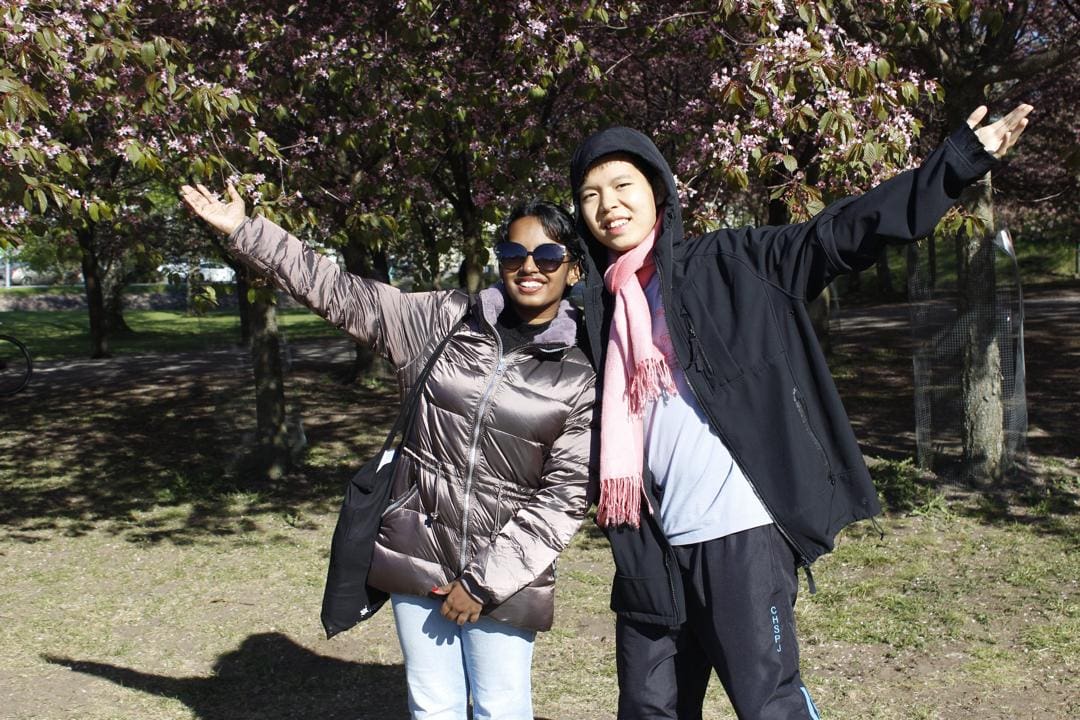
Kaveeshaswary had the opportunity to participate in the Malaysian Philosophy Olympiad with the assistance of her senior, aiming to deepen her understanding of the subject and achieve a high grade.
“During this journey, I learned about the Malaysian Philosophy Olympiad from a senior who introduced it to our foundation group. My main motivation for participating was to deepen my understanding and hopefully excel in the subject. My mother also encouraged me, seeing it as a great opportunity. She was even more enthusiastic than I was and believed from the start that I would qualify to go to Finland,” Kaveesha added.
She also revealed that she initially participated in the competition without expecting to learn more about philosophy. Kaveeshaswary said that, “to my surprise, this decision led to significant achievements. Not only did I gain a better understanding of philosophical concepts, but I was also selected as a Malaysian delegate for the International Philosophy Olympiad 2024 in Helsinki, Finland, and achieved an A+ in philosophy. I credit much of this success to my philosophy lecturer, Dr. Khairiah Mohd Yassin, whose inclusive teaching style greatly enhanced my interest in the subject.”
“As a newcomer to philosophy, my initial exploration focused on fundamental concepts taught at university, such as logic, morality, ethics, legal principles, and metaphysical theories. However, I soon realized that this foundational knowledge was inadequate for the rigorous demands of the International Philosophy Olympiad, where participants must write a comprehensive philosophical essay in four hours without any assistance.”
Eventually, through the initiative of the Malaysian Association of Education on Philosophy and Thinking (PPFPM), she had the opportunity to showcase her talents and enhance her knowledge. Additionally, participating in this event helped her sharpen her understanding through numerous lectures and classes.
“I had the opportunity to deepen my understanding through participation in numerous lectures and classes. These sessions covered a wide array of philosophical topics, including feminism, politics, mathematics, science, metaphysics, and more. This extensive preparation was crucial in broadening my philosophical perspectives and sharpening my analytical skills,” Kaveesha told.
Malaysian Olympiad Philosophy Selection Process

She further explained that, “the process for the Olympiad began with a series of online lectures on various topics, followed by an online essay writing segment to identify the top 15 students. We were then invited to participate in the Malaysian Philosophy Olympiad workshop in Kajang, which included a face-to-face test to select the top two students who would represent Malaysia.”
“A pivotal figure in my preparation journey was our head delegate, Ms. Hazieqa. She has been an immense source of motivation, consistently introducing me to some of the most complex topics in philosophy, such as medieval philosophy. Her guidance and encouragement were instrumental in helping me navigate and comprehend these challenging subjects.
Overall, my preparation for the Philosophy Olympiad involved an extensive and immersive exploration of diverse philosophical areas, which not only prepared me for the competition but also enriched my overall understanding and appreciation of philosophy.”
When addressing philosophical problems or questions, “I adopt a structured yet flexible approach that fosters creativity and critical thinking. During the Malaysian Philosophy Workshop, I was introduced to an essay-writing rubric designed to aid in crafting thought-provoking essays. While this rubric offers a helpful framework, I prefer not to adhere too rigidly to specific rules, as I find that strict guidelines can occasionally constrain my thought process and stifle creativity.”
She further explained that, “In my approach, I start by taking an argumentative stance, introducing an idea, agreeing with it to a certain extent, and then critically examining and challenging my viewpoint. This method showcases my ability to think deeply and analytically, while also demonstrating a balanced perspective that considers various aspects of a philosophical issue.
When constructing my arguments, I integrate ideas from influential philosophers like Plato, Kant, Sartre, Hooks, and others. By referencing their theories, I aim to anchor my arguments in established philosophical discourse and enhance the depth of my analysis. For example, I may use Plato’s theory of forms to explore abstract concepts, apply Kant’s categorical imperative to delve into ethical dilemmas, or consider Sartre’s existentialism when examining questions concerning human freedom and responsibility.”
Kaveesha’s Journey through Philosophy Olympiad
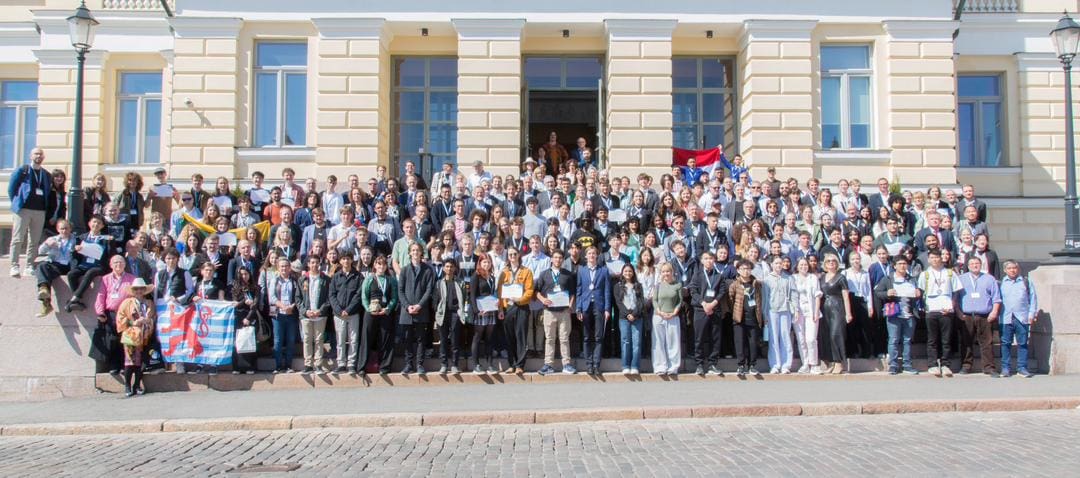
In every achievement, there are hurdles and challenges to overcome in pursuit of significant goals. This is evident in her statement that the most challenging aspect of participating in the Olympiad has been the extensive research required.
“Philosophy demands a deep engagement with numerous texts and ideas from renowned philosophers, which can be daunting for someone who isn’t naturally inclined towards reading. I found this particularly challenging as I was not much of a reader,” Kaveeshaswary stated.
“Compounding this challenge was my hectic foundation schedule, which included midterms and the Malaysian University English Test (MUET) examinations. Finding time to delve deeply into philosophical texts or online articles was quite difficult amidst these commitments.
To overcome this obstacle, I sought alternative methods to immerse myself in philosophy. I turned to watching philosophical videos on YouTube, listening to philosophical podcasts, and fully concentrating during preparation lectures. These resources allowed me to absorb a wealth of information in a more accessible and time-efficient manner. Additionally, I created a structured study schedule that prioritized essential readings and integrated shorter, more digestible materials into my daily routine. This approach helped me manage my time better and stay consistently engaged with philosophical topics.
Another significant challenge Kaveesha faced was her health. Due to the intense schedule, she fell very ill just a day before her departure to Finland. She experienced fever, flu, and a sore throat, and was extremely sleep-deprived and burned out. Despite these physical challenges, she remained determined to participate in the Olympiad.
“The cold weather in Finland added to the challenge, but my determination to represent my country and test my philosophical knowledge kept me going,” she said.
Pushing through such adversity was not easy, but it taught her invaluable lessons about resilience and dedication. She also realized that true commitment means persevering even when the odds are against you. The support of her family, friends, and head delegate also played a crucial role in keeping her spirits high and motivating her to give her best despite the challenges.
Kaveeshaswary told that, “participating in the Olympiad has significantly influenced my understanding of philosophy and broadened my perspective on several levels. Engaging in the Olympiad provided me with a unique opportunity to discuss philosophical content with other delegates who share a similar knowledge base and interests. This was an invaluable experience, as such discussions are rare in Malaysia, where exposure to philosophy is limited.”
Before this experience, she believed that Malaysians were generally uninterested in philosophy. However, interacting with other delegates made her realize that the real issue is the lack of accessibility to philosophical education in Malaysia. Unlike countries such as the United States and the United Kingdom, many Asian countries, including Malaysia, do not integrate philosophy into their education systems. This lack of exposure means that individuals might never encounter philosophical concepts unless they seek them out independently.
Her participation in the Olympiad has deepened her appreciation for the global philosophical community. Engaging with fellow delegates through discussions has broadened her grasp of diverse philosophical traditions and concepts. This experience has highlighted the crucial need to enhance the accessibility and inclusivity of philosophical education, ensuring that more individuals can gain from the critical thinking and analytical skills it fosters.
Kaveeshaswary continued that, “moreover, this experience has taught me the value of perseverance and the importance of seeking knowledge beyond conventional boundaries. It has motivated me to advocate for greater inclusion of philosophy in the education system and to explore ways to make philosophical resources more accessible to everyone.
One particularly thought-provoking question that I’ve encountered, which ultimately qualified me to represent Malaysia at the International Philosophy Olympiad, was inspired by the quote:
“We say that we have discovered a truth when we have found a certain thought that satisfies an intellectual need that we have previously felt. If we do not feel in need of that thought, it will not be a truth for us, (José Ortega y Gasset, Some Lessons in Metaphysics).”
Kaveeshaswary further expressed, “Moreover, this experience has taught me the value of perseverance and the importance of pursuing knowledge beyond conventional boundaries. It has inspired me to advocate for greater integration of philosophy into the education system and to explore ways to enhance accessibility to philosophical resources for everyone.
Kaveesha’s Insights from the International Olympiad
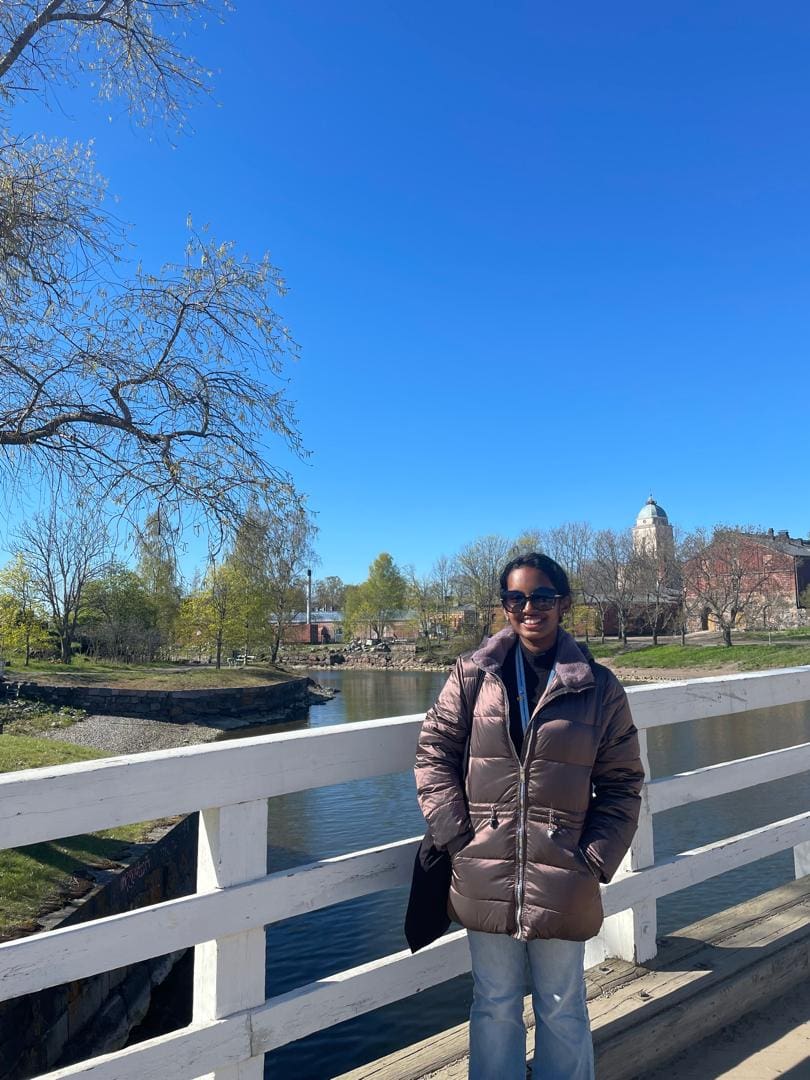
In contemplating this quote, she delved into various philosophical theories and perspectives, including the Correspondence Theory of truth, which asserts that truth depends on how well statements correspond with the actual state of affairs in the world.
“The exploration included Thomas Kuhn’s theory of scientific revolutions, indicating that truth evolves with paradigm shifts triggered by anomalies challenging established hypotheses. It also prompted reflection on human cognition limits and the potential fallibility of knowledge. It raised considerations about our ability to understand reality, suggesting that while we can grasp some aspects, fundamental truths may remain elusive due to inherent limits in our rational and empirical abilities.
It was this very quote that formed the basis of my essay, ‘The Truth of the Truths,’ which ultimately qualified me to represent Malaysia at the International Philosophy Olympiad. Writing this essay not only deepened my understanding of philosophy but also equipped me with the critical thinking skills and philosophical insights necessary to address complex philosophical problems on an international stage.”
She also explained that, “One interesting fact is that everything in life involves philosophy. As a famous quote states, ‘Philosophy is thinking about thinking. Believe me, even during arguments, you are engaging in philosophy.
Even when studying physics, it is fundamentally rooted in philosophical inquiry. Language itself is intertwined with philosophy. Philosophy permeates our lives, often unnoticed. This pervasive nature underscores how philosophical discussions in a competitive setting differ from those in informal settings.”
Eventually, through the initiative of the Malaysian Association of Education on Philosophy and Thinking (PPFPM), she had the opportunity to showcase her talents and enhance her philosophical knowledge. Additionally, participating in this initiative helped her sharpen her understanding through numerous lectures and classes.
This environment fosters a natural exchange of ideas, where individuals freely share perspectives, pose questions, and collectively explore concepts without strict boundaries. While philosophical discourse may not always be explicitly recognized in these interactions, it subtly influences discussions as participants naturally engage with profound inquiries about life, knowledge, and existence. If you find yourself drawn to philosophy, congratulations! You belong to a unique and intellectually curious segment of society,” Kaveeshaswary said.
“I encourage students aged 11 to 19 who are passionate about philosophy, particularly those from the Indian community, to join in the Malaysian Philosophy Olympiad. Although Malaysia has been sending delegates to this esteemed competition since 2018, it took me five years to represent Malaysia as the first Malaysian Indian. To stand strong with all other races in settings like these, we need more Indians.”

The role of parents and teachers is pivotal in fostering this interest. My own journey underscores the invaluable support many delegates receive from their parents: providing study materials, arranging attendance at lectures, and creating an environment conducive to intellectual development. Such encouragement from parents and educators is essential for young minds to flourish in competitive environments like these,” she recounted.
Kaveeshaswary also encourages all aspiring candidates to participate in the Malaysian International Philosophy Olympiad (IPO). Instead of being deterred by labels or societal norms, we should embrace our passion for philosophy and let it guide our intellectual journey.
“Broaden Your Reading Horizons While it’s valuable to study classic and modern philosophical texts, excellence in philosophy isn’t restricted to these. Exploring a variety of materials political articles, news segments, even gossip journals will enrich your understanding of human experiences and societal issues. This diverse reading cultivates critical thinking and enables you to apply philosophical ideas across different real world contexts,” Kaveesha said.
Follow us on Instagram, Facebook or Telegram for more updates and breaking news.


